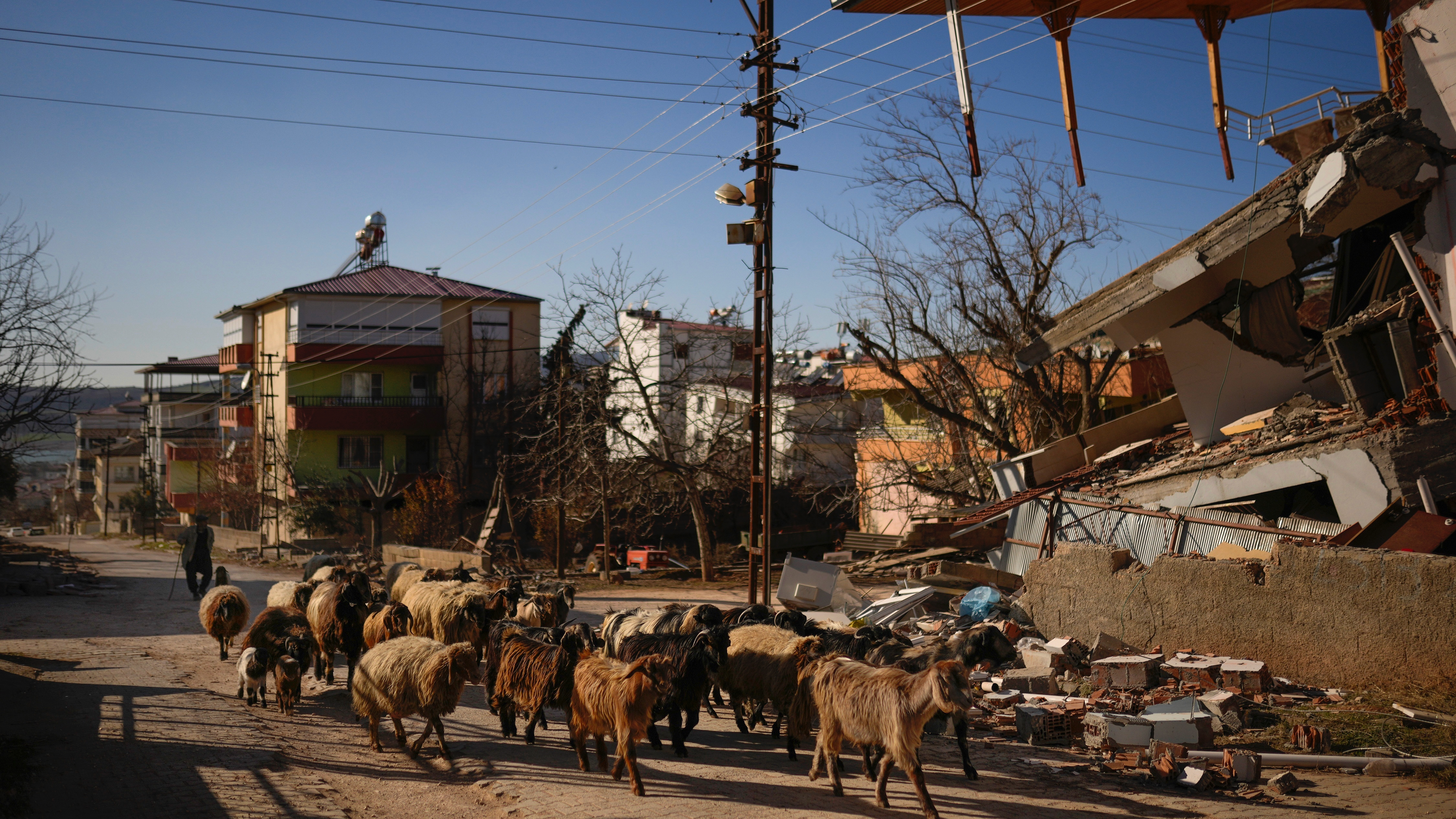A year on, a Kurdish village near Turkey’s earthquake epicenter says it’s been overlooked
Saliha Goksun lives in a converted shipping container near the ruins of her old home in the small town of Pazarcik in southern Turkey.
This past summer, Goksun and her neighbors built a metal frame between two container homes, and walled it in with corrugated metal to make a common area. They salvaged a washing machine and cook with propane.
A wood-burning stove is the only heat source for nine people. They only light it during the day, when the family is awake, because they fear the potential for carbon monoxide poisoning.
“It gets so cold, like ice,” Goksun said.
Goksun lost her home to the devastating earthquakes that hit Turkey and Syria a year ago this week — on Feb. 6, 2023. Every family here has lost four or five people, she said.
“After the earthquake, we don’t think about the future, or our dreams. We don’t think about anything,” Goksun said. “There’s nothing to do but focus on today.”
The 7.8 magnitude and 7.5 magnitude earthquakes killed more than 59,000 people in southern Turkey and northern Syria, while more than 100,000 were injured. At least 3 million people were made homeless overnight.
According to the Turkish government, 39,000 buildings were completely destroyed; 60,000 had to be demolished urgently; and 200,000 were seriously damaged.
But according to the UNHCR, about a million people are still living in container camps or informal campsites, in tents.
And there are also big gaps in aid. People who are Syrian refugees, and members of minority groups, say they’re struggling to get government assistance.
People in Pazarcik are Kurdish Alevis, an ethnic and religious minority that has long faced discrimination and targeted hate crimes, according to human rights groups.
Damla Gocek, a relative staying in the compound, said this disparate treatment carried over into the earthquake response.
“The government sent workers to rescue people, but they passed over our village, and went to help Turkish villages,” Gocek said. “They passed over us because we are Alevi.”
Turkey’s national emergency services did not respond to The World’s request for comment.
Neighbors had to dig Goksun’s brother, Ismail Göcek, out from under his home.
He said he was trapped under the rubble for five hours. By the time his neighbors got to his sister and elderly mother, they had died.
Ismail Göcek’s legs were crushed in the disaster, and he can no longer work in the nearby coal mine. He’s had 10 surgeries so far and gets a ride to a city an hour away for weekly appointments as he learns to live with his new disability.
Donations came in from Japan, and from the larger Alevi community in Turkey, Ismail Göcek said, but it was disjointed and disorganized.
“We received food, but there was no way to cook it,” he said. “[There were] hygiene items, but there was no water.”
Despite the fact that many of the apartment blocks in this town of 30,000 are cracked and damaged, shop owners like Ali Azkan, a butcher, said he had no choice but to reopen.
“Technically, the building above us has a ‘medium’ damage rating,” he said. “So, we applied for help and we’re waiting — either for funds to reinforce it, or for the government to demolish it.”
There’s nothing else to do, he said.
In Pazarcik, and the surrounding villages — the harsh living conditions have pushed many Alevis to go abroad in search of work — a trend that was already increasing with Turkey’s chronic economic problems.
In the nearby village of Payamlıbağ, Mehmet Beğendiş said that he knows 20 or 30 people who have left in the past year. Most are young, he said.
The lucky ones get visas to the EU. Others take risky, illegal routes into Europe.
“They already have to rebuild their lives,” Beğendiş said. “Starting over abroad gives them more hope.”
But Beğendiş said that he fears that this means Kurdish villages like Payamlıbağ will never be the same.
“It feels like a continuation of historic government policies pushing Kurdish Alevis off their lands,” Beğendiş said.
The village is emptying out — walking around, you only see elderly people and children, he said. It makes him wonder, he said, how can the town rebuild?
“It’s a difficult situation,” Beğendiş said. “When you migrate, you lose your culture, you lose your sense of belonging. And this is really sad for us. We wish people would stay.”
